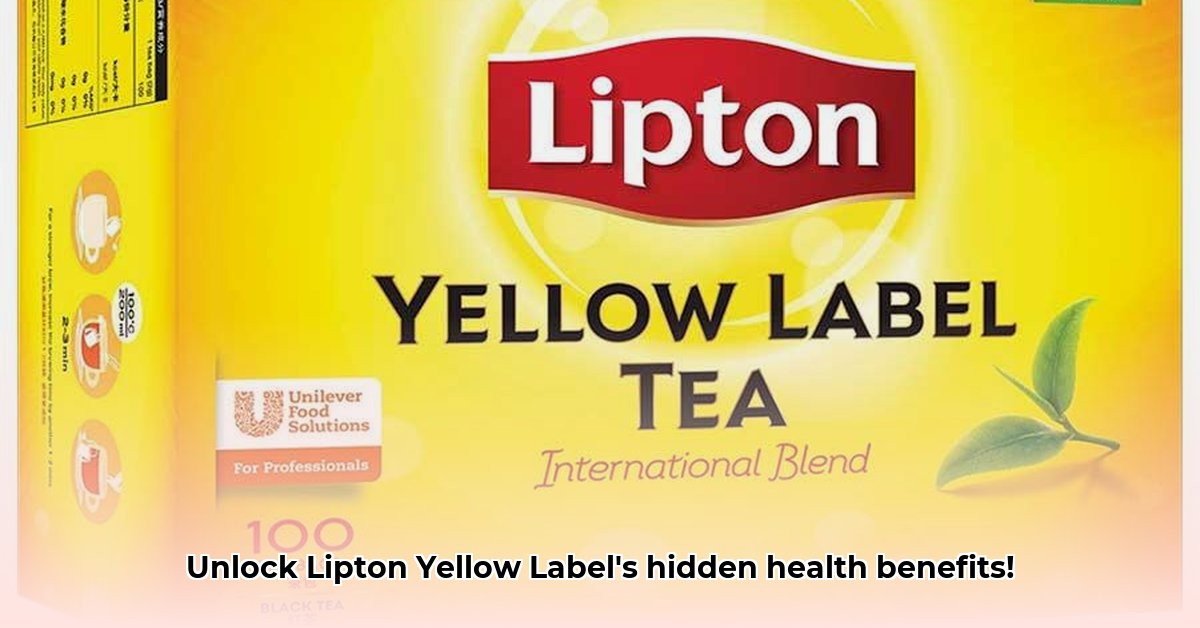
Lipton Yellow Label tea: a familiar yellow box, a comforting ritual for many. But beyond its warm aroma and familiar taste lies a complex story of potential health benefits and important considerations. This article explores the science behind Lipton Yellow Label, examining its strengths and limitations, and offering guidance on how to incorporate it into a healthy lifestyle.
The Antioxidant Advantage: Your Body's Natural Defense
Lipton Yellow Label, like other black teas, is rich in flavonoids, a type of antioxidant. Antioxidants combat free radicals—unstable molecules linked to aging and various health problems. Think of them as microscopic bodyguards, protecting your cells from damage. "These flavonoids may contribute to cellular health and potentially support the immune system," explains Dr. Anya Sharma, PhD, a nutritional scientist at the University of California, Berkeley. But how much of a benefit can you truly expect?
The research is promising, but not definitive. While many studies link high antioxidant intake with reduced risk of chronic diseases, more research is necessary to specifically quantify the impact of Lipton Yellow Label's flavonoids. Still, its antioxidant properties are undeniably a compelling aspect. Imagine your cells, bolstered by these tiny protectors, better equipped to fight daily oxidative stress.
Heart Health: A Promising Possibility, But Further Study Needed
Several studies have associated regular black tea consumption with a reduced risk of heart disease. This is partially attributed to the flavonoids mentioned above. “Flavonoids may help lower LDL cholesterol ('bad' cholesterol) and improve insulin sensitivity,” notes Dr. David Chen, MD, a cardiologist at Massachusetts General Hospital. While this is encouraging, direct research specifically on Lipton Yellow Label and its impact on cardiovascular health remains limited. Therefore, while the potential benefit is alluring, it shouldn’t be considered a standalone solution for heart health. A balanced diet and regular exercise remain paramount.
Beyond the Brew: A Balanced Approach to Wellness
It’s crucial to remember Lipton Yellow Label tea isn't a miracle cure. While its antioxidant and potential cardiovascular benefits are exciting, it's only one piece of the puzzle. A holistic approach that integrates a balanced diet, regular exercise, and adequate sleep is essential for overall well-being. Dr. Emily Carter, MD, a family physician in New York City, emphasizes, "Lipton Yellow Label can be a beneficial addition to a healthy lifestyle, but it shouldn't replace core health practices."
Lipton Yellow Label and Your Daily Routine: Simple Ways to Incorporate It
Ready to add Lipton Yellow Label to your day? Here's how:
- Morning Ritual: Start your day with a warm cup – a gentle way to wake up, provided you're not sensitive to caffeine.
- Afternoon Pick-Me-Up: Replace sugary sodas with a refreshing cup of tea – zero calories and a delightful taste.
- Evening Relaxation (Caffeine-Conscious): If you're not caffeine-sensitive, enjoy a calming cup before bed. If caffeine interferes with your sleep, opt for decaffeinated varieties or consume it earlier in the day.
Lipton Yellow Label: Weighing the Pros and Cons
| Pros | Cons |
|---|---|
| Abundant antioxidants | Contains caffeine (may disrupt sleep or cause digestive issues) |
| Potential cardiovascular support | Individual responses to caffeine vary significantly |
| May boost the immune system | Limited research on specific health benefits of Lipton Yellow Label |
| Zero-calorie beverage (plain) | May interact with certain medications |
| Affordable and widely available | May cause digestive upset in susceptible individuals |
| Pleasant taste and aroma | Not a replacement for medical care or a balanced diet |
Important Note: Individual responses to Lipton Yellow Label, including its caffeine content, can vary. If you experience any adverse effects, reduce your intake or consult your doctor. This information is for general knowledge and doesn't replace professional medical advice. Always consult your physician before making significant dietary changes.
How Much Caffeine Is In Lipton Yellow Label and Its Effects?
A standard 8-ounce cup of Lipton Yellow Label typically contains 30-50 milligrams of caffeine. However, this can vary depending on brewing time and water temperature. While this is less caffeine than many coffee drinks, it’s still a noticeable amount, and individuals respond to caffeine differently. Remember to brew the tea according to package instructions to manage your overall caffeine intake
Understanding Your Lipton Yellow Label Experience
Remember that the benefits and drawbacks of Lipton Yellow Label are highly individual. Pay attention to your body's signals and adjust your consumption accordingly. If caffeine causes sleep disruption, anxiety, or digestive upset, reduce your intake or switch to decaffeinated Lipton. Listen to your body, and above all, consult your doctor before making significant changes to your diet.